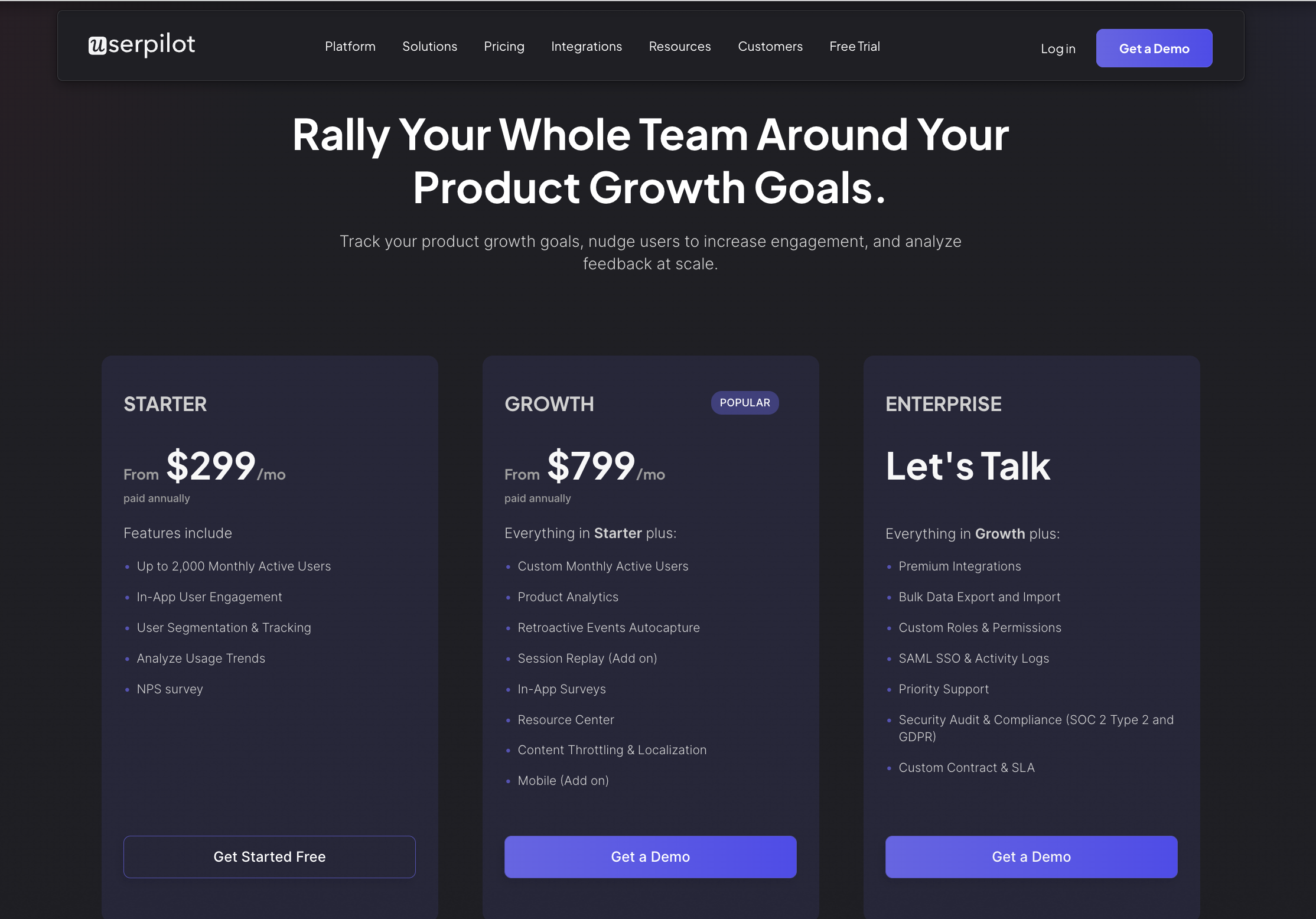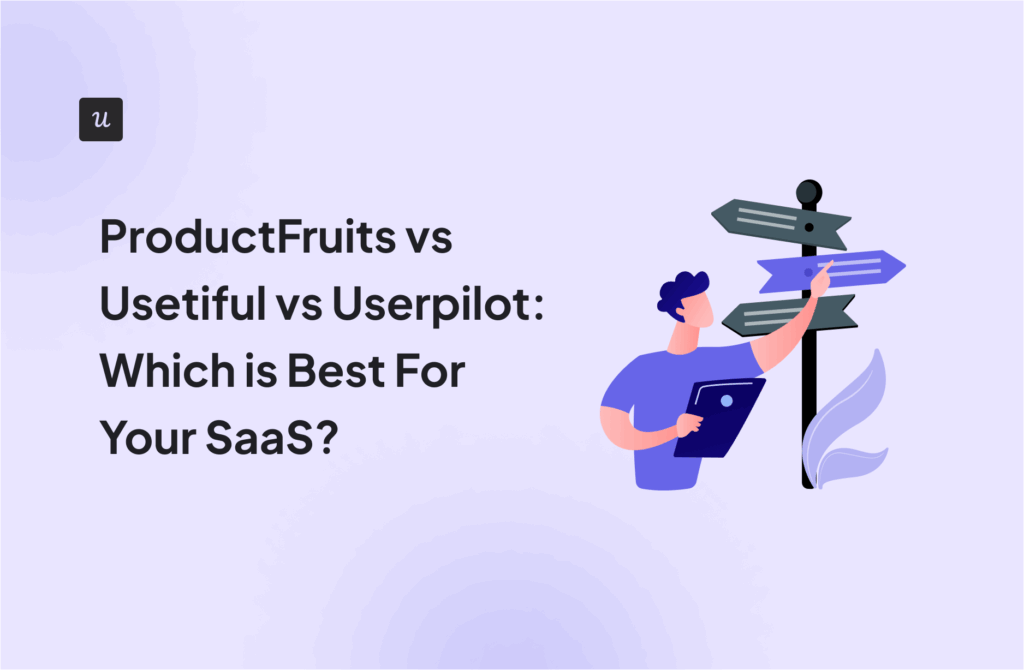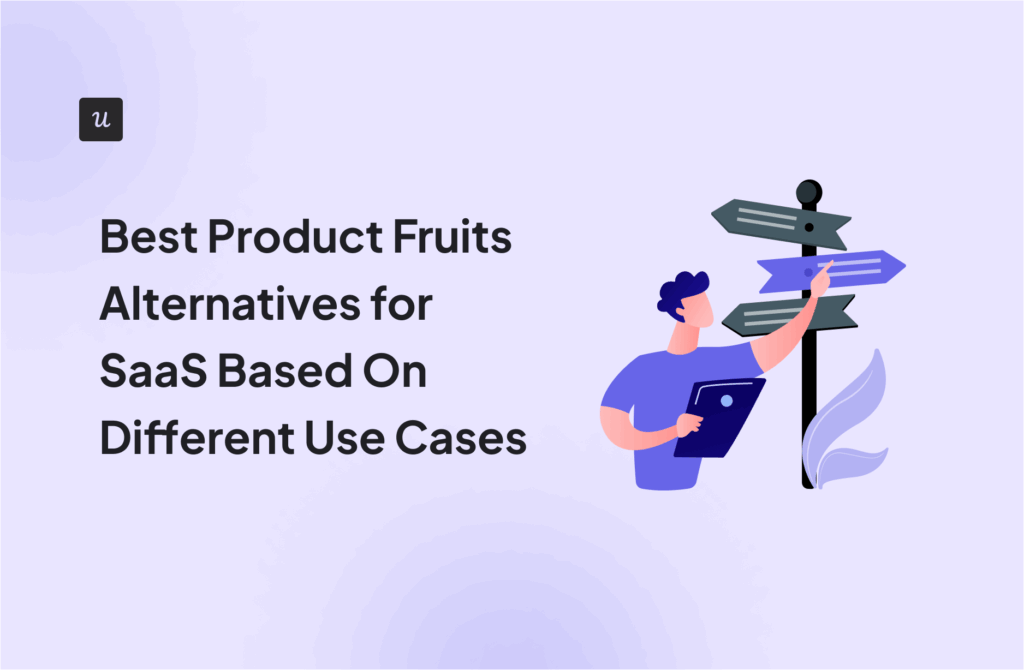
Get The Insights!
The fastest way to learn about Product Growth, Management & Trends.
What is Typeform?
Typeform is an online form builder that helps you build conversational forms for surveys, quizzes, contact forms, etc.
It is designed to make survey forms more engaging, elicit more thoughtful responses, and reduce form abandonment.
Why do you need Typeform alternatives?
Unfortunately, Typeform doesn’t always live up to its billing. Although its form templates are mostly great-looking, it also has many drawbacks, including:
- Limited Free Version: Typeform’s free plan enables you to create forms that hold a maximum of 10 questions and accept only 10 responses per month.
- Pricing: Typeform’s paid plans are quite expensive, starting at $29/month. To enjoy the real power of Typeform, though, you’ll need to get a Business plan which costs $83/month.
- Branding: While you can add your logo to your form on any of the paid plans, you can’t remove the Typeform branding unless you get the Plus plan or higher. Likewise, you’ll need a Business plan subscription to create a custom close screen.
- Payment Forms: If you choose to use Typeform to collect payments, you’ll only be able to accept payments through Stripe.
- Lag: Many users have noted that the Typeform interface begins to lag when they build complicated or long forms through the platform.
Clearly, there are several reasons to seek out an alternative to Typeform. So, which alternative form builder can give you good value for every penny spent?
What are the 12 best Typeform alternatives?
The best Typeform alternative for you will depend on a variety of considerations (pricing, robustness, integrations, etc.).
In this section, we’ve identified 12 of them that fit different criteria so you can find the one for you.
#1 – Userpilot
Userpilot is easily the best Typeform alternative for SaaS products. More than just a form builder, Userpilot is a Product Growth tool that helps you create engaging and frictionless product experiences.
Product teams use Userpilot to collect user feedback, conduct user surveys, and track user behavior. Whatever your use case, Userpilot is here to provide the insights you need to better understand your customers.

Main Features and Functionality
Userpilot provides a no-code drag-and-drop builder for creating online forms that help you collect feedback or personal data from users.
You can choose from a large selection of form templates or create custom forms in just a few clicks.

Userpilot also makes it simple to build and launch fully integrated NPS surveys to obtain a better understanding of customer loyalty.
You can ask follow-up questions with conditional logic to better understand the ‘why’ behind each response.

What if you have users who do not speak English? Userpilot’s localization features enable you to translate your survey questions and response options into your desired language to encourage more accurate answers.

Once you’re done creating these surveys, you can choose who sees it, when they see it, and where. This makes the survey contextual and increases the response rate. You can trigger a survey when a user engages a feature, embedding it into your welcome screen, etc.

The real power of Userpilot surveys, however, lies in the built-in analytics dashboard. In addition to a specialized NPS dashboard, you get a general dashboard for tracking, visualizing, and analyzing survey responses.

The response tagging feature adds even more power to your analytics, enabling you to visualize closed or open-ended responses and track how they evolve.

Finally, you’ll be able to use the responses you collect from your surveys to create specific user segments for future targeting.

Pros & Cons
Userpilot Pros
- Userpilot is available as an easy-to-use Chrome Extension builder. Integrating this no-code builder into your product requires no programming knowledge.
- Receive in-depth customer insights using the integrated NPS survey or other ready-made surveys with detailed analytics.
- Analyze product usage patterns and in-app flow engagements, and build custom user segments using the collected data.
- Choose from an array of UI patterns, including modals, slideouts, banners, tooltips, hotspots, and checklists, to build customized flows.
- Access every available UI pattern, even on the entry-level Traction plan.
- Build interactive walkthroughs and onboarding flows for different user segments and trigger them automatically.
- Design and launch an in-app resource center offering self-service support to your users through video tutorials, a knowledge base, in-app chat, etc.
- Conduct A/B tests on your onboarding flows and quickly iterate based on user behavior.
- Tag UI features to track engagement (clicks, form fills, hovers, etc.). Combine different features into a custom event for even more powerful analytics.
- Unlock value faster with built-in integrations, including Hubspot, Amplitude, Mixpanel, Segment, Kissmetrics, Heap, Intercom, and more.
Userpilot Cons
- Userpilot is currently limited to web apps and browsers only. It doesn’t run on desktop or mobile applications.
- There is currently no support for employee onboarding.
- Although Userpilot is an extremely powerful mid-market to enterprise-level tool, its starting price of $299/month is out of range for small startups on a shoestring budget.
Pricing
Although Userpilot is a bit on the expensive side if you’re only looking for surveys, compared to other feedback tools in the market, Userpilot offers greater value for money as it comes with all the necessary product growth tools like engagement, analytics, feedback, and session replays inside one platform. Here’s the detailed Userpilot pricing breakdown:
- The Starter plan is priced at $299 per month (billed annually). It’s designed for small teams or startups with up to 2,000 monthly active users. It includes in-app engagement tools such as walkthroughs, checklists, and banners, along with limited segmentation (up to 10 segments), basic analytics, NPS surveys, and email/live chat support.
- The Growth plan, starting at $799 per month (billed annually), is intended for growing teams needing more advanced product analytics and feedback mechanisms. It includes all Starter features and adds unlimited segmentation and tagging, retroactive event tracking, advanced analytics like funnels and retention, as well as various in-app surveys including PMF, CES, and CSAT. It also enables localized content, content throttling, and access to a self-service Resource Center. Add-ons include session replays and mobile support. This tier comes with a dedicated Customer Success Manager, phone support, and domain customization.
- The Enterprise plan is customized for large organizations with more complex needs. It includes everything in the Growth plan plus additional features such as premium integrations, custom roles and permissions, bulk data management, SAML 2.0 SSO, and activity logs. It also offers priority support with service-level agreements, security audits, and custom billing options. Pricing for this plan is provided upon request.

#2 – HubSpot Web Forms
The HubSpot Form Builder is a part of the HubSpot Marketing Hub and one of the foremost Typeform alternatives. Form responses are automatically added to your CRM database, making lead tracking and nurturing easier.

Main Features and Functionality
- Customizable Forms: Drag and drop form templates to create custom forms and surveys that match your brand styling and needs.
- Custom Form Fields: Choose from a wide selection of form fields to collect ready-to-use data for your reports and analysis.
- Analytics: Connect marketing tools from the marketing hub with sales tools to get real-time analytics on form submissions and track conversion rates.
- Stress-free data collection: Combine smart fields and progressive profiling to ease the burden of filling out long forms.
Pros & Cons
HubSpot Pros
- Create customizable forms that integrate with HubSpot’s ecosystem and feed into your conversion funnel.
- Connect to the HubSpot CRM to automate workflows and trigger follow-up tasks.
- Smart Fields and Progressive profiling make long forms easier to fill out.
HubSpot Cons
- Advanced features require a pricey premium plan, with prices starting at $800/month.
- Modifying existing templates is not as easy as with other form builders.
Pricing
HubSpot offers a limited free version for users looking to try out its platform. It also offers three pricing plans for its advanced features, starting from $18/month.

#3 – SurveyMonkey
SurveyMonkey is a robust tool that lets you create surveys, polls, and quizzes for any audience. It offers extensive customization options and advanced analytics.

Main Features and Functionality
- Custom logic rules: Make surveys more engaging and personalized by tailoring new questions to previous answers.
- Pre-built templates: Choose from a library of over 200 pre-built form templates.
- Analytics: Automatically visualize form data with charts, graphs, and pivot tables.
- Integrations: Integrate with popular CRMs and marketing automation tools like HubSpot, Salesforce, and Marketo.
Pros & Cons
SurveyMonkey Pros
- Create advanced forms quickly with custom branding (theme, logo, font style/size, etc.).
- Connect your forms to a large number of third-party apps using Zapier.
- Build mobile-friendly, fully responsive forms.
SurveyMonkey Cons
- Although SurveyMonkey supports basic logic and branching, it lacks advanced logic options.
- The pricing structure is complex and confusing.
Pricing
SurveyMonkey offers a basic free version and an as-needed Enterprise plan with five other pricing tiers, starting from $25 per user per month for teams and $34 per month for individuals.

#4 – GetFeedback
GetFeedback is a form builder designed for customer experience professionals, with tools for feedback collection and analysis across both digital and traditional channels.

Main Features and Functionality
- Interactive forms: Make your forms smarter and more engaging by skipping or including questions based on customer responses.
- Omnichannel distribution: Share your survey across email, social media, chat, SMS, software application, or the web.
- Integrations: Receive advanced insights into form responses with integrations like Campaign Monitor and Salesforce Sales Cloud.
Pros & Cons
GetFeedback Pros
- GetFeedback is an intuitive drag-and-drop builder for creating custom forms.
- Create forms quickly for use across different channels, including web, app, email, etc.
- Easily create forms with simple conditional logic.
GetFeedback Cons
- The builder is sometimes glitchy.
- There are limited integrations outside of Salesforce.
- It has no free plan.
Pricing
GetFeedback offers three pricing plans, although the actual price for each plan isn’t provided on its website.

#5 – FormAssembly
FormAssembly is an intuitive form builder for creating on-brand web forms for surveys, applications, contact forms, etc.
Although it is one of the more expensive Typeform alternatives, its seamless workflow and collaboration features place it on this list.
Main Features and Functionality
- Automation: Streamline and automate data collection processes. Use conditional steps to automatically route data and act on them.
- Drag-and-drop: Create surveys and workflows with a visual no-code builder.
- Smart Integrations: Integrated Salesforce and HTTPS Connector make data transfer and analysis a breeze.
- Payment Integrations: Collect online payments with Paypal and Stripe on your payment forms.
Pros & Cons
FormAssembly Pros
- FormAssembly’s powerful connectors greatly extend its powers.
- Formulas and advanced conditional logic enable the creation of conversational forms.
- A powerful knowledge base with helpful guides to get you started.
FormAssembly Cons
- Some features require a bit of coding experience to implement.
- Saving a form edit can be confusing depending on where in the form the edit is made.
- The price is a bit higher than other options.
Pricing
Like GetFeedback above, FormAssembly’s pricing is mostly shrouded in secrecy.
However, there are five pricing plans, with pricing starting at $167 per month which can be a little pricy compared to other products in the market.

#6 – Outgrow
Outgrow is a powerful content marketing platform that lets you build personalized polls, quizzes, and assessments, among others.

Main Features and Functionality
- Segmentation: Filter users by their responses and retarget them for future surveys.
- Extended Reach: Embed forms and surveys on your social media or website in a variety of ways.
- Management: Take advantage of over 1000 integrations to transfer data and automate follow-up actions.
Pros & Cons
Outgrow Pros
- Supports complex conditional logic and branching.
- Integrates with a large selection of third-party marketing software.
- Easily segment leads based on their answer choices.
Outgrow Cons
- Pricing adds up quickly as you access more features.
- While easy to use there is still a learning curve if you want to create more complex quizzes and calculators.
- Users mentioned that every feature they need is in the higher tier so it’s always more expensive than you expect.
Pricing
Outgrow boasts a limited free version and four primary pricing plans, with pricing starting at $14 per month. It also offers custom plans for Enterprise users.

#7 – Jotform
Jotform is one of the more robust Typeform alternatives that helps you create powerful forms and handle a variety of business needs.

Main Features and Functionality
- Conversational forms: Create a conversational form with a drag-and-drop builder.
- Data management: Organize data with Jotform Tables and turn them into PDFs with the Jotform PDF Editor.
- Dynamic forms: Hide form fields, selections, or pages based on user responses.
Pros & Cons
Jotform Pros
- Supports 150+ integrations.
- Enables payment collection through debit/credit cards, ACH payments, and more.
Jotform Cons
- Subscriptions have limitations on forms and response views.
- It’s hard to read and fill out on mobile browsers because of the tendency to be cut off on the screen.
Pricing
Jotform offers a free plan.
However, more features are available with three primary payment tiers, starting at $39 per month. It also offers a custom Enterprise payment tier for large users.

#8 – Wufoo
Wufoo is a flexible form builder for building contact forms, event registration forms, survey forms, etc.

Main Features and Functionality
- Automation: Automatically transfer form data to CRM and marketing automation systems like Salesforce, MailChimp, etc.
- Payment Integrations: Collect payments using Stripe, Paypal, and other payment platforms.
- Analytics: Analyze data with the one-click report feature or export to a spreadsheet for more analysis.
Pros & Cons
Wufoo Pros
- Connect to WordPress with a WordPress form builder plugin.
- Data protection with 256-bit SSL encryption.
Wufoo Cons
- Some functionalities require coding expertise.
- Some users mention that it does not integrate with existing frameworks.
Pricing
Wufoo provides five pricing plans, starting with a limited free version. Pricing on its payment categories begins at $19 per month.

#9 – SurveySparrow
SurveySparrow is a versatile form builder that enables businesses to quickly create powerful online forms for deployment across a variety of platforms.

Main Features and Functionality
- Engaging surveys: SurveySparrow is one of the best Typeform alternatives for creating engaging conversational forms.
- Advanced analytics: A vibrant dashboard provides in-depth data visualization and insights.
- Mobile-friendly: Build mobile-friendly surveys that can be filled out on any device.
Pros & Cons
SurveySparrow Pros
- SurveySparrow contains a robust performance management tool for employees.
- It enables multi-channel data collection, making embedding forms on different platforms easy.
SurveySparrow Cons
- Advanced customization may require some technical knowledge.
- A lot of users mention bad customer service as their primary issue.
Pricing
Unfortunately, SurveySparrow hides its prices until you provide your info. However, its general Survey pricing category contains three plans starting at $49 per month.

#10 – Zoho Forms
Zoho Forms is a great Typeform alternative with the ability to display one question at a time in a conversational manner.

Main Features and Functionality
- Advanced customization: Customize the look and feel of your online forms with advanced branding features.
- Integration: Easily integrate into Zoho’s CRM and other tools.
- Advanced reporting: Get advanced analytics and reporting for both form submissions and user behavior.
Pros & Cons
Zoho Forms Pros
- Create forms online or offline.
- Choose from a collection of industry-specific templates to create over 30 different form types.
- Secure your forms with SSL, field encryption, CAPTCHA, etc.
Zoho Forms Cons
- May require a steep learning curve for non-technical users.
- Limited form design.
Pricing
Zoho Forms is one of the cheapest Typeform alternatives on this list, with prices starting from $10 per month.

#11 – Paperform
Paperform is an intuitive online form builder for creating survey forms, payment pages, etc. While it may not be the most robust of tools, it boasts useful features for building complex forms.

Main Features and Functionality
- Payment Integrations: Receive payments, donations, and subscriptions via Stripe, Paypal, Braintree, Square, and more.
- Analytics: Quickly analyze form performance and responses.
- E-commerce Features: Manage your inventory and collect payments with over 85 integrated payment processors.
Pros & Cons
Paperform Pros
- Supports over 25 field types, including e-signatures, appointments, etc.
- Enables conditional logic for page/question control and more.
- Easily embed forms into your website.
Paperform Cons
- Limited form customization options.
Pricing
Paperform has no free plan. However, it has a three-tiered pricing structure, with prices starting at $20 per month.

#12 – ProProfs Survey Maker
Our final alternative to Typeform, Proprofs Survey Maker, is especially useful for businesses looking to quickly create engaging forms, surveys, quizzes, polls, etc.

Main Features and Functionality
- Large template library: Over 100 templates and 100k+ professionally curated questions.
- Integrations: Supports popular tools like Zendesk, WordPress, and Salesforce.
- Multiple survey types: Built-in options for pop-up surveys, NPS surveys, sidebar surveys, etc.
Pros & Cons
ProProfs Pros
- Design engaging surveys in just a few minutes.
- Receive real-time response notifications.
- Customize surveys with your colors, themes, logos, and images.
ProProfs Cons
- Advanced features are reserved for the premium plan or higher.
- They have a very limited number of templates, and they are not customizable.
- Uploading images, audio, and video when making a quiz is a time-consuming task. Takes a lot of clicks.
Pricing
ProProfs Survey Maker has three pricing categories for Email Surveys, Contextual Surveys, and Contextual + Email Surveys. The last option is the more robust of the bunch, with pricing starting at $79 per month.

Conclusion
There are several Typeform alternatives, including some which didn’t make this list, like Google Forms, Formidable Forms, etc.
However, this list captures a good selection of alternatives for different use cases and budgets.
Of course, Userpilot comes highly recommended for SaaS products. It is more than an online form creator, offering tools for behavioral analysis, NPS surveys, in-app notifications, and more. Book a demo today to learn more!





